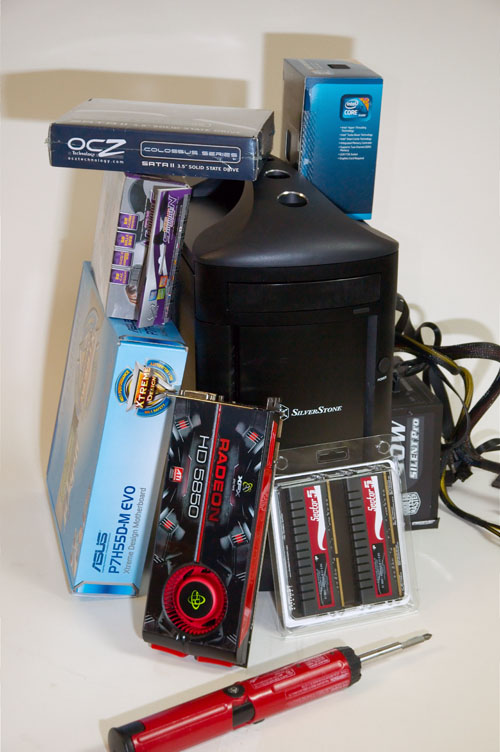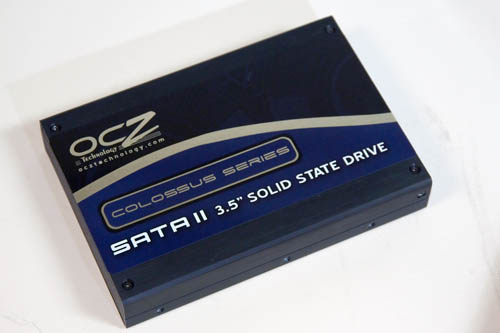The Components
Bear in mind that this system is an experimental build. So you’ll get to go along for the full ride, including all the gotchas and warts I encountered. Sometimes you learn more from the mistakes and glitches than if everything went smoothly.
First, cost was no object. That didn’t mean I had a bottomless budget, but it did mean I wasn’t going to skimp on components. The goals for the system were pretty simple:
- Low power usage at idle
- Good gaming performance
- Very quiet
- Relatively small. It would be something you could lug around to LAN parties.

Let’s check out the component list.
|
Component |
Brand / Model |
Cost |
|
CPU |
Intel Core i5 661 |
$205 |
|
Motherboard |
Asus P7H55D-M EVO |
$135 |
|
CPU Cooler |
Scyther Big Shuriken Low |
$ 35 |
|
Memory |
4GB Patriot Viper II Sector 5 DDR3-1600 |
$110 |
|
Graphics Card |
XFX Radeon HD 5850 |
$299 |
|
Hard Drive |
OCZ Colossus 250GB 3.5” SSD |
$849 |
|
Optical Drive |
Asus BC-08B1ST Blu-ray combo drive |
$110 |
|
PSU |
Cooler Master Silent Plus Pro 500W |
$100 |
|
Case |
Silverstone SG04B-FH |
$159 |
|
OS |
Windows 7 Home Premium OEM x64 |
$105 |
|
Total |
|
$2,107 |
That’s over $2,100 for a dual core gaming rig. Of course, for the $850 cost of the SSD, you could practically build a new system. But we’re in the pursuit of knowledge here, so damn the cost and full speed ahead.











81 Comments
View All Comments
Nfarce - Wednesday, January 27, 2010 - link
+1Yeah, no kidding. WTF *is* the point of this?
"Loyd builds a small form factor, high performance, low power gaming system. Is it worth the effort..."
Dunno, you tell me AT - there is nothing to see here currently.
stromgald30 - Wednesday, January 27, 2010 - link
+1Seriously, this is just a summary of somebody's build. Isn't there a forum for this somewhere?
Articles on the front page should be evaluating something objectively like the case design or benchmarking some components. These articles lack a control/standard (i.e. it's hard to compare the built system / relevant component with a similar or dissimilar build with the same component).
This seems to do very little to help anybody building a SFF other than to make the obvious subjective comment that "it's cramped" and everything is a tight fit. The additional comments about the push pins and motherboard layout seem better suited for motherboard or HSF specific reviews.
tjaisv - Wednesday, January 27, 2010 - link
Agreed.What was the point of this article again? lol
And if somebody had $2000 to spend on a new system i highly doubt they'd be using a core i5 in it anyway.
Griswold - Wednesday, January 27, 2010 - link
For people, such as you, who either buy pre-built machines or ask for a shopping list on the forums, there is nothing (yet) to see there.Why not read the last sentecne of the article again?
Flunk - Friday, January 29, 2010 - link
My desktop is a small formfactor high performance system in a similar Silverstone case that I build over 2 years ago, I know several people with similar systems. They're not unusual enough for an article like this, certainly not "experimental".Penti - Wednesday, January 27, 2010 - link
This should be posted as a blog post.therealnickdanger - Wednesday, January 27, 2010 - link
"Why not read the last sentecne of the article again?"Why not just wait a couple weeks and give us a real review when it's over? AT has built a reputation for being thorough and objective - this preview provides neither. How about compiling benchmarks on the system he built compared to the $900 version he suggests building? As it stands, the article offers no compulsive evidence of any kind, ultimately serving no purpose as an Anandtech review... not even a preview, really.
jamesadames12 - Wednesday, February 3, 2010 - link
http://www.asdpoolsupply.com/pages.php?pageid=11">http://www.asdpoolsupply.com/pages.php?pageid=11mcbowler - Friday, April 2, 2010 - link
There is no reason for a large case anymore. I built a micro-atx PC, however, not quite as small as the silverstone. I put a 5870 and some cheaper AMD AthlonII X3 in it and the thing handles games like a champ. Would have loved to put the SSD in it but its not needed. Here is the case I used. I think a 5970 will fit too.http://www.newegg.com/Product/Product.aspx?Item=N8...
Can't wait to see AMD's vision of its Black Fusion PC come to life.
kondor999 - Monday, May 10, 2010 - link
I built a similar system, but much more powerful:- Same Case.
- Antec Quattro 1000w ($139 after rebate at Fry's).
- EVGA P55 Micro SLI mobo ($84 after rebate at Newegg).
- Core i5-750 OC to 4.0 Ghz using Corsair H50 water cooler (top 120mm fan used for radiator).
- 2 GTX 480's in SLI (yes, they fit and run cool enough - barely).
- Replaced bottom 120mm fan with a speed-adjustable MFDB one, and attached a Zalman Fan-mate to control speed.
- Used card slot at top of case for an exhaust fan (very helpful, given that heat rises and would otw accumulate at the top of the case).
- Intel G2 SSD 80gb boot drive.
- WD Velociraptor WD6000HLHX 600gb game drive.
If I get more ambitious, I may water-cool the 480's with Danger Den waterblocks and mount a 2-fan rad on the back using a Swiftech radbox-mounted DRIVE heat exchanger/pump/reservoir.
This gives me a complete state-of-the-art system that is actually luggable to LAN parties (or, in my case, to work when I feel like closing my office door and goofing off).
It also happens to blow the doors off the "experimental" system described in the article. Mainly because, in a gaming system, $1000 worth of videocards beats an $850 SSD any day. I spent the money where it really counts.
Yay ;-)